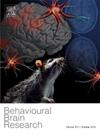鼠李糖乳杆菌国产菌株可减轻阿尔茨海默病动物模型的认知缺陷和促炎细胞因子表达。
IF 2.6
3区 心理学
Q2 BEHAVIORAL SCIENCES
引用次数: 0
摘要
背景:微生物群失调在神经炎症和阿尔茨海默病(AD)中起着重要作用。因此,使用适当的益生菌恢复肠道微生物组可能有利于缓解阿尔茨海默病的特征。在本研究中,我们研究了鼠李糖乳杆菌(L. rhamnosus)国产菌株对基于炎症的 AD 模型中空间记忆和细胞因子表达的影响:雄性 Wistar 大鼠被随机分为四组(每组六只),分别为对照组、仅鼠李糖乳杆菌组、仅 D-半乳糖(D-gal)组和 D-gal + 鼠李糖乳杆菌组。使用莫里斯水迷宫试验评估空间学习和记忆。IL-1β、IL-6和TNF-α的表达水平采用实时qPCR法测定。统计分析的显著性水平为 0.05:结果:与 D-gal + 鼠李糖处理组相比,仅用 D-gal 处理组在 MWM 测试中的记忆力低于对照组。此外,D-gal处理导致IL-1β和TNF-α水平升高,IL-6水平下降,但无统计学意义。然而,与单纯 D-gal 处理组相比,D-gal + 鼠李糖球菌处理组的 TNF-α 水平明显下降(P < 0.05)。此外,与对照组相比,D-gal + 鼠李糖处理组的IL-6水平明显降低(P < 0.05):这些结果表明,国产鼠李糖可能会对认知缺陷和神经炎症产生积极影响。建议进一步研究鼠李糖对AD动物模型认知功能和神经炎症影响的具体机制。本文章由计算机程序翻译,如有差异,请以英文原文为准。
A domestic strain of Lactobacillus rhamnosus attenuates cognitive deficit and pro-inflammatory cytokine expression in an animal model of Alzheimer’s disease
Background
Microbiome dysbiosis plays a significant role in neuroinflammation and Alzheimer’s disease (AD). Therefore, gut microbiome restoration using appropriate probiotics may be beneficial in alleviating AD features. In this study, we investigated the effects of a domestic strain of Lactobacillus rhamnosus (L. rhamnosus) on spatial memory, and cytokines expression in an inflammation-based AD model.
Method
Male Wistar rats were randomly divided into four groups (six animals per group) of control, L. rhamnosus-only, D-galactose (D-gal)-only, and D-gal + L. rhamnosus. Spatial learning and memory were assessed using the Morris water maze test. IL-1β, IL-6, and TNF-α expression levels were measured using Real-Time qPCR. A significance level of 0.05 was used for statistical analysis.
Results
In contrast to the D-gal + L. rhamnosus-treated group, D-gal only treated group showed impaired memory in MWM test compared to the control group. Additionally, D-gal treatment resulted in an increase in IL-1β and TNF-α levels and a decrease in IL-6 levels, which was not statistically significant. However, the TNF-α level was significantly decreased in D-gal + L. rhamnosus-treated group compared to D-gal-only treated group (P < 0.05). Also, IL-6 level was significantly lower in D-gal + L. rhamnosus-treated group compared to control group (P < 0.05).
Conclusion
These results suggest that the domestic L. rhamnosus might positively impact cognitive deficit and neuroinflammation. Further studies are suggested to investigate the specific mechanisms mediating the effects of L. rhamnosus on cognitive functions and neuroinflammation in animal models of AD.
求助全文
通过发布文献求助,成功后即可免费获取论文全文。
去求助
来源期刊

Behavioural Brain Research
医学-行为科学
CiteScore
5.60
自引率
0.00%
发文量
383
审稿时长
61 days
期刊介绍:
Behavioural Brain Research is an international, interdisciplinary journal dedicated to the publication of articles in the field of behavioural neuroscience, broadly defined. Contributions from the entire range of disciplines that comprise the neurosciences, behavioural sciences or cognitive sciences are appropriate, as long as the goal is to delineate the neural mechanisms underlying behaviour. Thus, studies may range from neurophysiological, neuroanatomical, neurochemical or neuropharmacological analysis of brain-behaviour relations, including the use of molecular genetic or behavioural genetic approaches, to studies that involve the use of brain imaging techniques, to neuroethological studies. Reports of original research, of major methodological advances, or of novel conceptual approaches are all encouraged. The journal will also consider critical reviews on selected topics.
 求助内容:
求助内容: 应助结果提醒方式:
应助结果提醒方式:


